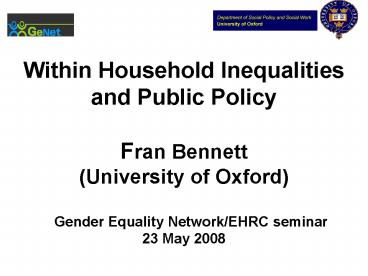Within Household Inequalities and Public Policy Fran Bennett University of Oxford
1 / 16
Title: Within Household Inequalities and Public Policy Fran Bennett University of Oxford
1
Within Household Inequalities and Public
PolicyFran Bennett (University of Oxford)
- Gender Equality Network/EHRC seminar
- 23 May 2008
2
Research project
- ESRC funded Gender Equality Network
(www.genet.ac.uk) Project 5 - Within Household Inequalities and Public Policy
Fran Bennett, Sue Himmelweit, Holly Sutherland,
Sirin Sung, Jerome de Henau - Qualitative, quantitative and policy simulation
elements
3
Overview of project
- The family is a key site of distribution (of
resources, time and labour) (Daly and Rake, 2003,
Lister, 2005) - but is often a black box which
is not investigated and in which equality is
assumed. - Aims
- To explore alternative approaches to
understanding the behavioural and distributional
impact of policy change which take account of
gender inequalities in power and influence in the
household - To use such approaches to analyse the effects of
actual and potential changes in fiscal, social
security and associated labour market policies
4
Relevant policy developments
- Separation of tax credits into WTC for earner(?)
and CTC for main carer - Joint claims for JSA new duties, no benefit
- Abolition of most working age dependants
increases (except in means-tested benefits) - More change in womens relations with state - but
action on claimants partners ceased?
work-focused interviews for carers halted
5
Obstacles to gender awareness
- Family unitary household view
- Time analysis of household at one point, not
individuals over lifecycle - eg workless/
work-rich versus work-poor (households)
family-friendly tax (meaning 1 vs 2 earners) - Benefits seen as primarily for household need,
rather than social protection over lifetime or
individual citizenship rights
6
Government views
- Net tax rate for families - but income tax and
NI contributions are individually based - Highlights redistribution to women but largely
for others and amounts, not roles/
relationships/resources (Daly Rake, 2003) - Tension between individualisation in labour
market policies and joint assessment/joint
ownership in benefits and tax credits?
7
Gender and money issues
- From previous research, we know that it is not
just how much income comes into the household
which may be important but also - - where income is from (source)
- - why it is being paid (purpose)
- - who receives it (recipient)
- - what it is called (labelling) and
- - how it is managed and controlled
8
Qualitative research overview
- Aim to identify policy-relevant factors
influencing gendered division of power - Qualitative research
- uncover within-household processes
- identify indicators of intra-household division
of power and wellbeing - explore gendered impact of recent and potential
policy changes
9
Qualitative research sample
- Semi-structured, separate interviews with
- people in 30 low/moderate income couples
- Sample from BHPS/ECHP (booster)
- Heterosexual couples, mostly both of
- working age, had children at some point
- In England, Wales, Scotland (not N Ireland)
- If possible, in receipt of means-tested
- benefits/tax credits, now and/or in past
10
Unitary household ?
- Drivers to jointness strong in our sample
- - virtually all were married (many remarried)
- - all had had children at some point
- - living on low/moderate income
- Expressed loyalty to couple/family found
- (all in one pot, no yours and mine, you
never dream by yourself) - Joint account symbolic of togetherness (but in
practice, degree of jointness varied)
11
Benefits/tax credits
- Speculative questions often difficult
- Issues of payee/ownership harder to disentangle
than envisaged - Insistence that many benefits/tax credits
belonged to/were for family - Lifecycle individual perspective lacking
- So were gender and money issues from previous
research irrelevant?
12
Income source and purpose
- Different sources affect sense of entitlement
- Money in own right meaningless to many men but
not having to ask key for women - Women aware of individual/family tensions
- Contradictory statements by men/women eg joint
claim for TC right WTC belongs to him - Commonly mans wage into joint account,
benefit(s)/tax credits into womans
13
Income recipient and label
- Contributions may give sense of ownership
- Joint claims/ownership not seen as problem - but
frustration about joint assessment? - Carers allowance and disability benefits can
give (degree of) autonomy/voice - Benefits could be seen as contribution
- Virtually no questioning of child benefit
- Main carer (for child tax credit) resented
14
Income management/control
- Not just what/where from but how handled
- Knowledge of family income was gendered
- Traditional gender roles key (pocket money for
man, Im bills shes food) but may coexist
with strong desire for independence - Timing of payments important (changing)
- Deprivation for women due to both managing role
desire for independence?
15
Goals and policy dilemmas
- How to protect those in traditional roles whilst
not solidifying gender roles? - How to ensure individual income whilst not
undermining move to paid work? - How to move towards autonomy whilst not assuming
it has been achieved? - To what extent to share caring more in society or
between men and women?
16
Potential policy directions?
- Emphasise societal support for caring and
maintain benefits to meet costs (otherwise likely
to be burden on women) - Instead of extra support to one partner in couple
investigate situation of other partner - Extend social protection for individuals
- Support gender role sharing
- Consider wider households not just families

